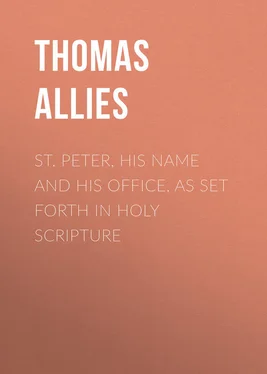Thomas Allies - St. Peter, His Name and His Office, as Set Forth in Holy Scripture
Здесь есть возможность читать онлайн «Thomas Allies - St. Peter, His Name and His Office, as Set Forth in Holy Scripture» — ознакомительный отрывок электронной книги совершенно бесплатно, а после прочтения отрывка купить полную версию. В некоторых случаях можно слушать аудио, скачать через торрент в формате fb2 и присутствует краткое содержание. Жанр: foreign_antique, foreign_prose, на английском языке. Описание произведения, (предисловие) а так же отзывы посетителей доступны на портале библиотеки ЛибКат.
- Название:St. Peter, His Name and His Office, as Set Forth in Holy Scripture
- Автор:
- Жанр:
- Год:неизвестен
- ISBN:нет данных
- Рейтинг книги:3 / 5. Голосов: 1
-
Избранное:Добавить в избранное
- Отзывы:
-
Ваша оценка:
- 60
- 1
- 2
- 3
- 4
- 5
St. Peter, His Name and His Office, as Set Forth in Holy Scripture: краткое содержание, описание и аннотация
Предлагаем к чтению аннотацию, описание, краткое содержание или предисловие (зависит от того, что написал сам автор книги «St. Peter, His Name and His Office, as Set Forth in Holy Scripture»). Если вы не нашли необходимую информацию о книге — напишите в комментариях, мы постараемся отыскать её.
St. Peter, His Name and His Office, as Set Forth in Holy Scripture — читать онлайн ознакомительный отрывок
Ниже представлен текст книги, разбитый по страницам. Система сохранения места последней прочитанной страницы, позволяет с удобством читать онлайн бесплатно книгу «St. Peter, His Name and His Office, as Set Forth in Holy Scripture», без необходимости каждый раз заново искать на чём Вы остановились. Поставьте закладку, и сможете в любой момент перейти на страницу, на которой закончили чтение.
Интервал:
Закладка:
St. Peter, His Name and His Office, as Set Forth in Holy Scripture
PREFACE
The present work took its rise, and is largely drawn, from the very learned Father Passaglia's "Commentary on the Prerogatives of St. Peter, Prince of the Apostles, as proved by the authority of Holy Writ," which was published in Latin, in 1850. The eighth and ninth chapters are, indeed, translations, respectively, of the twenty-seventh of his first book, and the first of his second book. And as to the rest, my obligations are more than I can specify. I owe, on the other hand, many excuses to Father Passaglia, for while I have only partially observed his order in treating the subject, I have considered his whole work as a treasure-house of learning, whence I might draw at my pleasure "things old and new," adapting them, as I thought good, to the needs of the Protestant mind, as familiar to me in England. Thus I have not scrupled to translate, to omit, or to insert matter of my own, according to my judgment. It seemed to me of paramount importance to present to the English reader the whole chain of scriptural evidence for the Primacy and prerogatives of St. Peter. This chain of evidence is so strong, that, when I first saw it completely drawn out, it struck my own mind, brought up in the prejudices of Protestantism, with the force of a new revelation. I put to myself the question; is it possible that they who specially profess to draw their faith from the written Word of God, would refuse to acknowledge a doctrine set forth in Holy Scripture with at least as strong evidence as the Godhead of our Lord itself, if they could see it not broken up into morsels, like bits of glass reflecting a distorted and imperfect image, according to the fashion of citing separate texts without regard to the proportion of the faith, but presented in a complete picture on the mirror of God's Word? This picture is thus complete and perfect in Father Passaglia's work. Yet the form of that work, no less than its bulk, the scrupulous minuteness with which every opposite interpretation of so many adversaries in modern times is answered, as well as the fulness with which every part of the subject is treated, made me feel that a simple translation would not be tolerated by the impatience of a population, which has little time and less mind for studies of this character. I have pursued, therefore, the humble task of popularising , so far as I could, Father Passaglia's work, omitting, as I trust, no essential part of the argument, and grouping it under different combinations, each of which might be in turn presented to the eye, and so more readily embraced.
The importance of the argument, as it affects the Papal Supremacy, which is but a summary of the whole cause at issue between Protestantism in every shape, and the Church of Christ, cannot be overrated. If St. Peter be already set forth in Scripture as the Head and Bond of the Apostolic College, if he be delineated as the supreme Ruler who succeeds our Lord Himself in the visible government of His Church on earth, there becomes at once the strongest ground for expecting that such a Ruler will be continued as long as the Church herself lasts. Thus a guiding clue is given to us among all the following records of antiquity. Tradition and history become illuminated with a light which exhibits all objects in their due proportion and true grouping, when they are shown to be but the realisation of what the Incarnate Word, His Church's one only Lawgiver, decreed from the beginning, set forth not only in prophetic image, but distinct command, and stored up in words of such exceeding power, that they bear the whole weight of the kingdom of God, stretching through all ages and nations, without effort or pressure. And if ancient writers speak in no doubtful tone of St. Peter's prerogatives, yet clearer, more emphatic, and soul-piercing, as we should expect, are the words of God Himself, appealing in man's form to the mind and heart of man, whom He had created, and was come to redeem, and to knit into one eternal monarchy.
A subsequent part of the argument, namely, that the Bishop of Rome is successor of St. Peter, has been treated by the author in another work, "The See of St. Peter the Rock of the Church, the Source of Jurisdiction, and the Centre of Unity," specially in the fifth section, which ought, logically, to be preceded by this treatise. It is there proved that not only the Christian Fathers, as individual writers and witnesses, but the ancient Church in her universal Councils, did, with one voice, from age to age, regard the Pope as sitting in St. Peter's chair, which is proof enough, and all that can in reason be demanded, that the prerogatives given to St Peter as Head of the Church were, in the belief of the Church, and in full accordance with our Lord's own promise, 1 1 Matt. xvi. 18. – "Thou art Peter, and upon this rock I will build my Church, and the gates of hell shall not prevail against it," i. e. , as founded on that rock. The foundation and the superstructure coexist for ever.
continued on to his successors, and are as imperishable as the life of the Church herself.
21, North Bank, Regent's Park, September, 1852.
CHAPTER I.
THE NAME OF PETER PROMISED, CONFERRED, AND EXPLAINED
Our Lord tells us that He came upon earth to "finish a work;" and He likewise tells us what that work was, the setting up a living society of men, who should dwell in Him and He in them; on whom His Spirit should rest, with whom His presence should abide, until the consummation of all things. For, the evening before His passion, "lifting up His eyes to heaven, He said: Father, the hour is come. * * * I have glorified Thee on the earth: I have finished the work which Thou gavest Me to do. * * I have manifested Thy name to the men whom Thou hast given Me out of the world. Thine they were, and to Me Thou gavest them; and they have kept Thy word. * Holy Father, keep them in Thy name, whom Thou has given Me; that they may be one, as We also are. While I was with them I kept them in Thy name. – And now I come to Thee. – I pray not that Thou shouldest take them out of the world, but that Thou shouldest keep them from evil. * * As Thou hast sent me into the world, I also have sent them into the world. And for them do I sanctify Myself, that they also may be sanctified in truth. And not for them only do I pray, but for those also who through their word shall believe in Me; that they all may be one, as Thou, Father, in Me, and I in Thee; that they also may be one in Us; that the world may believe that Thou hast sent Me. And the glory which Thou hast given to Me, I have given to them, that they may be one, as We also are one. I in them, and Thou in Me; that they may be made perfect in one; and the world may know that Thou hast sent Me, and hast loved them as Thou hast loved Me. * * And I have made known Thy name to them, and will make it known; that the love wherewith Thou hast loved Me may be in them, and I in them." 2 2 John xvii.
In these terms the Eternal Word condescends to declare to us that the fruit of His Incarnation, the "finished work" which His Father had given Him to do, was the establishment of a society whose unity in "truth" and "love" should be so perfect, that He exemplifies it by the indwelling in each other of the Divine Persons; which should be perpetual and visible for ever, so that the world by it and in it should recognise His own mission, and believe in the Sender; and that the dowry of this society, thus perpetually visible, should be the equally perpetual possession of truth – the revelation of God's will – and of love, which is conformity to it. And He based these unexampled promises on no less a guarantee than the Almighty Power and ineffable Goodness of His Father, witnessed by His own dwelling amongst us in our flesh.
Читать дальшеИнтервал:
Закладка:
Похожие книги на «St. Peter, His Name and His Office, as Set Forth in Holy Scripture»
Представляем Вашему вниманию похожие книги на «St. Peter, His Name and His Office, as Set Forth in Holy Scripture» списком для выбора. Мы отобрали схожую по названию и смыслу литературу в надежде предоставить читателям больше вариантов отыскать новые, интересные, ещё непрочитанные произведения.
Обсуждение, отзывы о книге «St. Peter, His Name and His Office, as Set Forth in Holy Scripture» и просто собственные мнения читателей. Оставьте ваши комментарии, напишите, что Вы думаете о произведении, его смысле или главных героях. Укажите что конкретно понравилось, а что нет, и почему Вы так считаете.












